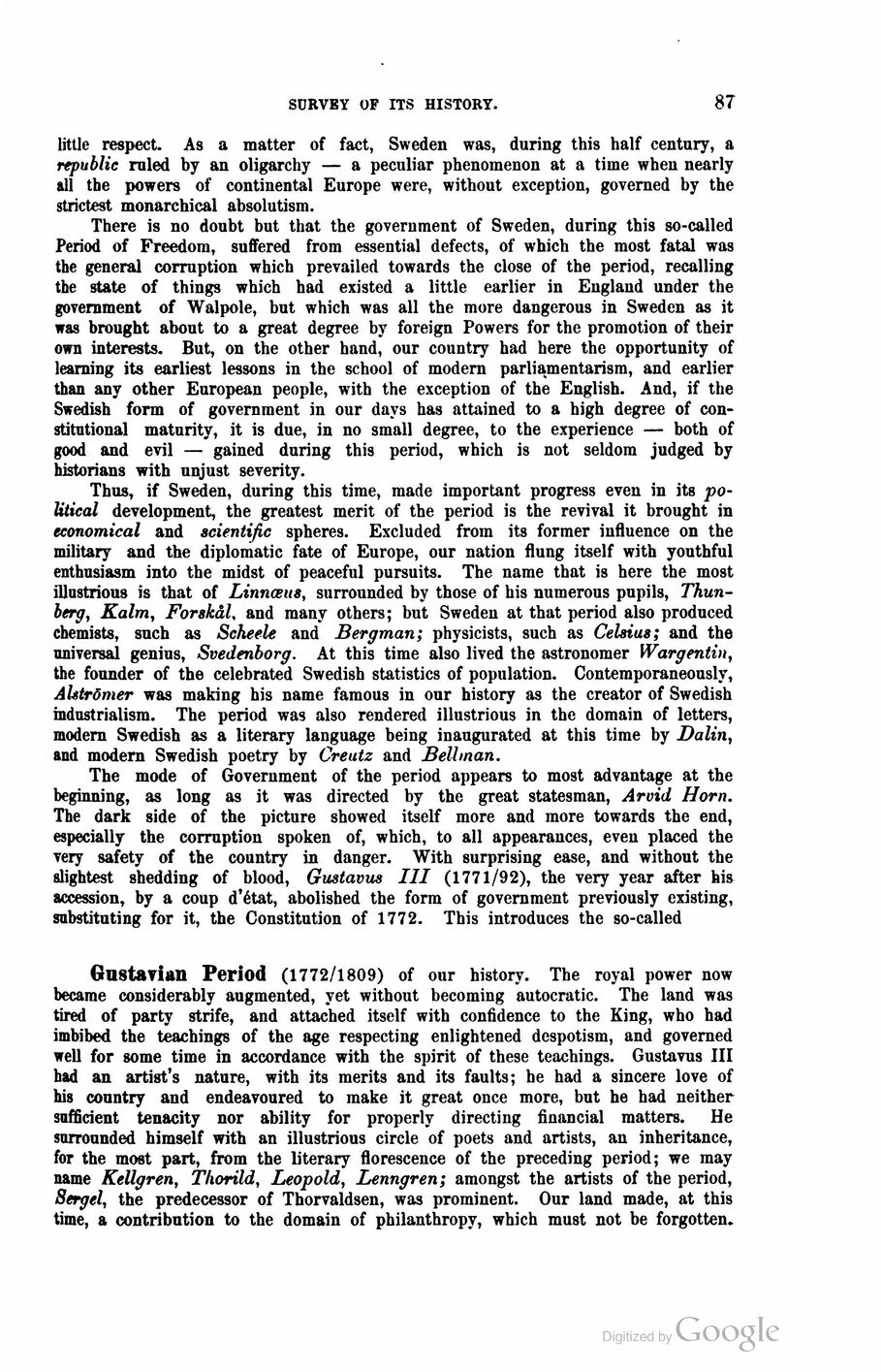
Full resolution (JPEG) - On this page / på denna sida - First part - II. The Swedish People - 1. Survey of its History. By E. Svensén, Author, Stockholm - Modern Times (from 1523 onwards)

<< prev. page << föreg. sida << >> nästa sida >> next page >>
Below is the raw OCR text
from the above scanned image.
Do you see an error? Proofread the page now!
Här nedan syns maskintolkade texten från faksimilbilden ovan.
Ser du något fel? Korrekturläs sidan nu!
This page has never been proofread. / Denna sida har aldrig korrekturlästs.
SURVEY OF ITS HISTORY.
87
little respect. As a matter of fact, Sweden was, during this half century, a
republic ruled by an oligarchy — a peculiar phenomenon at a time when nearly
all the powers of continental Europe were, without exception, governed by the
strictest monarchical absolutism.
There is no doubt but that the government of Sweden, during this so-called
Period of Freedom, suffered from essential defects, of which the most fatal was
the general corruption which prevailed towards the close of the period, recalling
the state of things which had existed a little earlier in England under the
government of Walpole, but which was all the more dangerous in Sweden as it
was brought about to a great degree by foreign Powers for the promotion of their
own interests. But, on the other hand, our country had here the opportunity of
learning its earliest lessons in the school of modern parliamentarism, and earlier
than any other European people, with the exception of the English. And, if the
Swedish form of government in our days has attained to a high degree of
constitutional maturity, it is due, in no small degree, to the experience — both of
good and evil — gained during this period, which is not seldom judged by
historians with unjust severity.
Thus, if Sweden, during this time, made important progress even in its
political development, the greatest merit of the period is the revival it brought in
economical and scientific spheres. Excluded from its former influence on the
military and the diplomatic fate of Europe, our nation flung itself with youthful
enthusiasm into the midst of peaceful pursuits. The name that is here the most
illustrious is that of Linnasus, surrounded by those of his numerous pupils,
Thunberg, Kalm, Forskål, and many others; but Sweden at that period also produced
chemists, such as Scheele and Bergman; physicists, such as Celsius; and the
universal genius, Svedenborg. At this time also lived the astronomer Wargentin,
the founder of the celebrated Swedish statistics of population. Contemporaneously,
Alströmer was making his name famous in our history as the creator of Swedish
industrialism. The period was also rendered illustrious in the domain of letters,
modern Swedish as a literary language being inaugurated at this time by Dalin,
and modern Swedish poetry by Creutz and Bellman.
The mode of Government of the period appears to most advantage at the
beginning, as long as it was directed by the great statesman, Arvid Horn.
The dark side of the picture showed itself more and more towards the end,
especially the corruption spoken of, which, to all appearances, even placed the
very safety of the country in danger. With surprising ease, and without the
slightest shedding of blood, Gtistavus III (1771/92), the very year after his
accession, by a coup d’état, abolished the form of government previously existing,
substituting for it, the Constitution of 1772. This introduces the so-called
6n8taYian Period (1772/1809) of our history. The royal power now
became considerably augmented, vet without becoming autocratic. The land was
tired of party strife, and attached itself with confidence to the King, who had
imbibed the teachings of the age respecting enlightened despotism, and governed
well for some time in accordance with the spirit of these teachings. Gustavus III
had an artist’s nature, with its merits and its faults; he had a sincere love of
his country and endeavoured to make it great once more, but he had neither
sufficient tenacity nor ability for properly directing financial matters. He
surrounded himself with an illustrious circle of poets and artists, an inheritance,
for the most part, from the literary florescence of the preceding period; we may
name Kellgren, Thorild, Leopold, Lenngren; amongst the artists of the period,
Sergei, the predecessor of Thorvaldsen, was prominent. Our land made, at this
time, a contribution to the domain of philanthropy, which must not be forgotten.
<< prev. page << föreg. sida << >> nästa sida >> next page >>